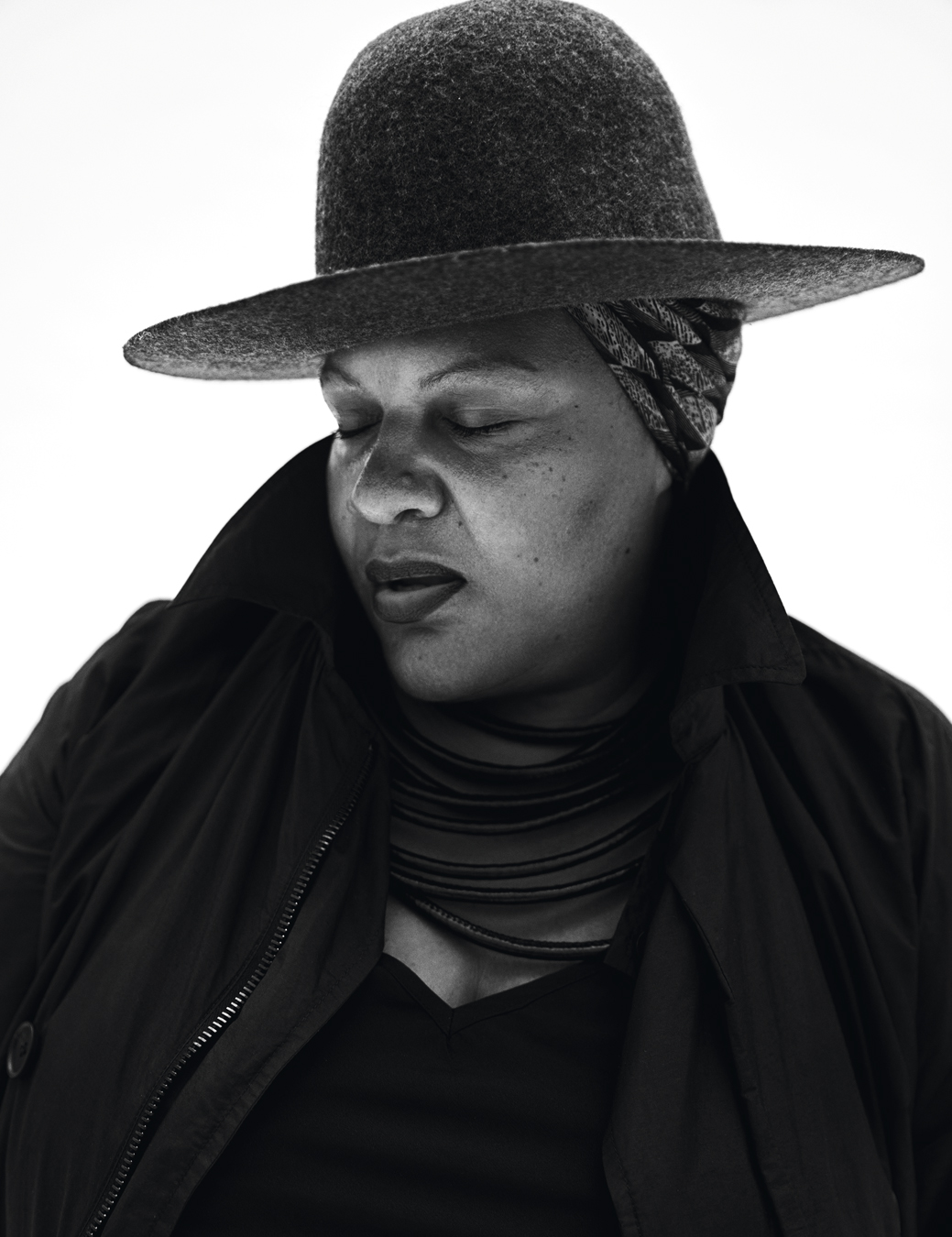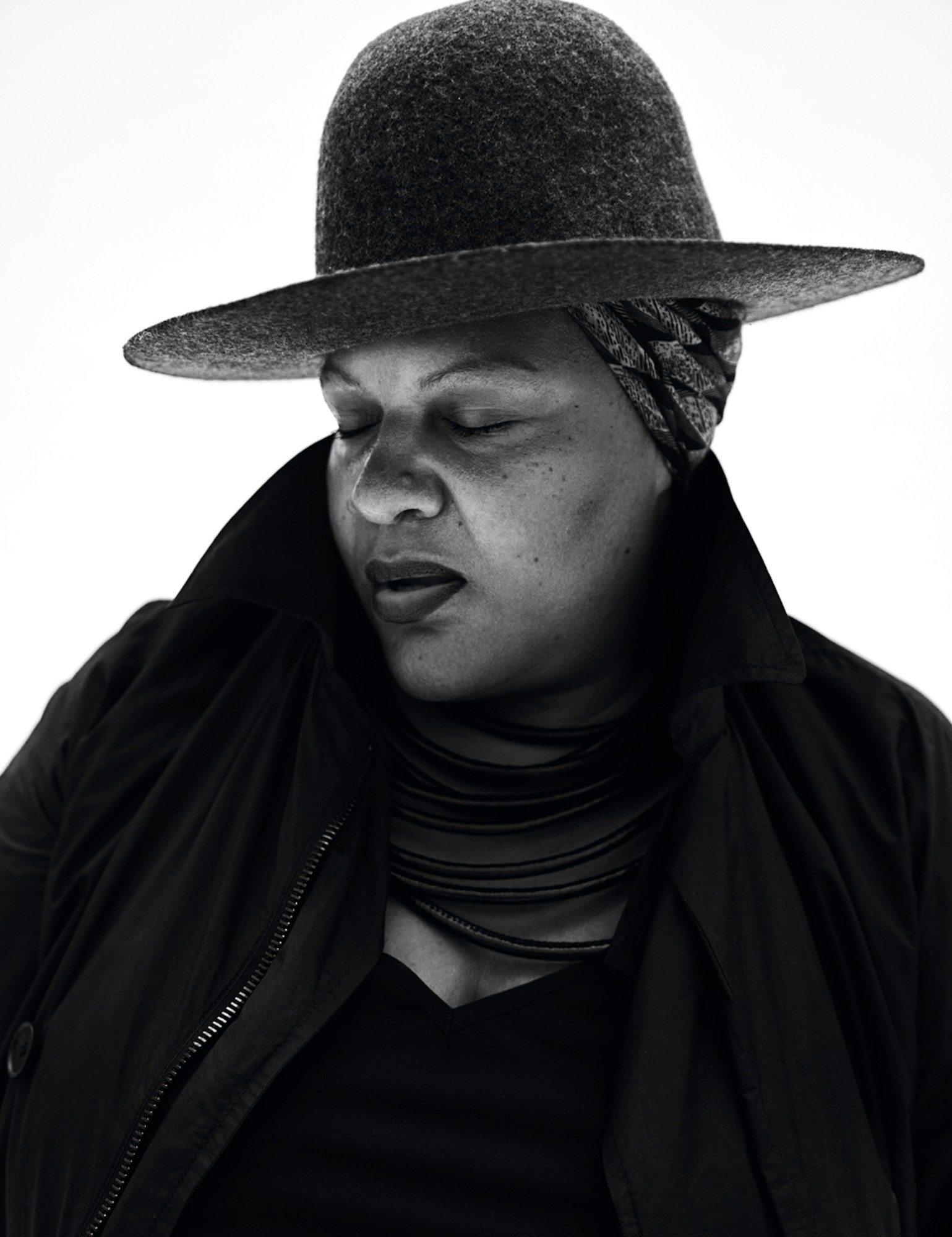This story originally appeared in i-D’s The Darker Issue, no. 365, Winter 2021. Order your copy here.
Radha Blank is a filmmaker, writer and actress. Her first feature, The 40 Year-Old Version, released in 2020, won the U.S. Dramatic Competition Directing Award at the Sundance Film Festival.
Why don’t you start off by introducing yourself?
I’m a writer and I guess a director now. A native New Yorker. I rap sometimes. I make music sometimes. What else? I’m Carol’s daughter. I very proudly wear that. I’m an artist in flux. I just made The 40-Year- Old Version and it certainly changed my public profile, but I don’t know if it’s changed my internal profile. More people are getting acquainted with my work but that also has meant a certain expectation from the industry that I’m not comfortable with.
The exposure has caused me to retreat into myself. Probably because I’m playing a version of myself in the film, and I shot in my apartment. That’s my mother’s artwork. That’s my big brother in the film. That’s my dad’s jazz music. I did all that to play with storytelling but it invited people in a way I was a little naive about. Other people have done this in the past, but maybe they enjoy the attention.
People think I want to be a star or in movies and really, I don’t. The things that people may think I want for myself are at odds with my actual desires. So when people call and say, “we’re going to do a shoot, what are your sizes?” I’m just like, “what?” I’ve found this ongoing part of the journey about having to define who you are, by what people perceive you to be, to be difficult.
I’m a film director, but I haven’t been on set in two years so it is starting to get to me. I’m sure a lot of people are suffering from that because of the pandemic and the constraints it puts on the ability to create something in the world. But the blessing of that is it’s forcing me to rethink what it means to make something. Now that I’ve experienced being a film director, I want more of it. But I also want to build off from what I started with the film, and that has been challenging. So I’m in flux. I’m not as grounded as I thought I would be in the process.

You weren’t only just directing, starring or writing but doing
all three. I think that level of commitment is why the film is so successful. It’s really striking in its honesty. But I’d imagine that level of vulnerability is tough.
I’m empathic and I feel like I internalise a lot. I take on a lot, and when I go in and pull out, it is like unleashing a large part of my energy force from my center. It has taken me a long time to replenish and restore it. The only thing I could compare it to is giving birth and what it does to a woman’s body, and how there’s a lot of rest that she has to take for herself.
And like being a mother the work doesn’t end once the baby is out. I was not prepared for the work that comes along with promoting an independent film. I thought I did the work on set and in post. And I might have had a different experience working outside of the giant streaming empire, but it just took so much of me. I did not want it to be just about me, and yet a lot of the time it did become that. It was just easier. “This is the face of the film.” And for some people there was fascination around a Black woman taking on that role.
There was a lot of fascination. What I’m happy about is how that fascination was met with a lot of love for the film. I’m probably going to Denver in two weeks to talk about the movie and I’m looking forward to it, because I didn’t get a chance to engage with many live audiences during Covid. I re-showed the movie in New York at the Paris Theater in August, which was a big deal because I was able to show it on thirty five millimeter film. It was the first showing I’d done since Sundance in January 2020. I didn’t realise how badly I needed to engage with the audience. Getting to talk about the film was such a great release.
I’m not going to lie and say that last year wasn’t bittersweet for me, because I did not get to have my debutante moment. I know what a blessing it is that I get to connect to more audiences almost a year and a half after I finished the film. I won’t know how it really feels until I make a second film. Mary Harron, known for Who Shot Andy Warhol? and American Psycho, has been a big sister in the biz to me. And she’s like, “it’s the second film, Radha.” You put everything in the first film. But it’s the second film where you really get to build on your voice or clearly define what it is that you’re trying to say in the world. I’m looking forward to the day when I can make a second film. I just want to make something that my mom would be proud of, but that also feels authentic to who I am as a woman, as a Black person, a human, a New Yorker, and as a storyteller.
I hope to remain as independent as possible. I see so many of my counterparts moving into that Hollywood paradigm, working with the studios. And there’s this thing about Black women being strong and thick skinned, and that’s bullshit. That’s not real, and I’m not going to play into that narrative. I have thin skin and I’ve worked in the industry long enough to know that engaging with the major studios might not work for me. I’m just way too sensitive to be arguing with a white man over the relevance of a particular Black character and Black voices, storytelling and authenticity in narrative.
I’m not resilient. I have been traumatised by people in the industry trying to put a dress on me that is three sizes too small. And I’ve tried to wear it because I want to be at that party. But I am trying to create my own party because I don’t feel like the industry was ever meant to sustain an authentic Black presence. It wasn’t built around that shit. Their bottom line is dollars and numbers and my bottom line is spiritual survival and authenticity. I don’t know if the two worlds mesh.
All the contradictions that exist in this industry never cease to amaze me. How they will celebrate the individuality that draws them in, but then want you to change. Maybe I’m naive, but I have to believe there’s someone out there, who after seeing what I can do when you leave me the fuck alone to do it, will also step up and say, “Yeah, okay. I’m investing in you and I’m leaving you alone.”
I’m so glad you mentioned the myth of the strong Black woman. The models we have for Black women in Hollywood, for the most part, are these titans. And not that there’s anything wrong with that, but that doesn’t feel like a sustainable model.
That’s about brand. When it comes to Black women, I think Hollywood is more comfortable when we are a brand and a symbol. It makes them feel better in performing anti-racism by getting behind this brand. The symbol of a strong Black woman is very romantic, but our strength shows up in different ways. Sometimes it’s very quiet. Sometimes you don’t see it. And sometimes we’re not strong, and a lot of times I think we’re performing strength.
We’re allowed to be a brand or symbol, but we can’t be auteurs, because the auteur is about being mysterious. It is about being quiet. It’s about disappearing. It’s why I’m at odds with all of the exposure. On the converse side, I know how important it is for young Black girls to see a woman who is not a size two, who is in a head wrap and bamboo earrings on 125th St. I get that.
I think that Black women are really hot right now, but in a particular way. Our survival is so sexy to people. So many people have bought into this theme. That’s what people see as our conflict. It’s always surrounding some kind of emotional pain and trauma. And I’m just like, “Have you met Black people?” We go through all kinds of shit. I can’t say I’ve known someone who got shot, you know what I’m saying? I’ve heard gunshots, damn sure. But there are so many jubilant, joyful stories, more emotional conflicts and journeys that I know of that I just don’t see reflected on the big screen. I’m tired of the “Black woman is resilient” narrative because I’m not that resilient Black woman, and I’m not playing into that fake sexy ass, hands-on-hip, shit.
I want to talk to director Radha. Who are your influences? Who are you excited by?
John Cassavetes, Sidney Lumet, Hal Ashby, Kathleen Collins, Robert Townsend. Those are the people who’ve inspired me to tell a story, and helped me not feel crazy. Looking at their work, I love the idea of characters laid bare, where the filmmaker is not apologising for their characters’ flaws. They are directors who trust their actors, and I want to be that person.
Well, thank you Radha.
Thank you very much. I appreciate it.
Credits
Photography Mario Sorrenti
Fashion Alastair McKimm
Hair Bob Recine
Make-up Kanako Takase at Streeters using Addiction Beauty
Nail technician Honey at Exposure NY using Smith & Cult
Photography assistance Kotaro Kawashima and Javier Villegas
Digital technician Chad Meyer
Fashion assistance Milton Dixon III and Casey Conrad
Tailor Martin Keehn
Hair assistance Kazuhide Katahira
Make-up assistance Kuma
Production Katie Fash, Layla Néméjanski and Steve Sutton
Production assistance William Cipos
Casting director Samuel Ellis Scheinman for DMCASTING
